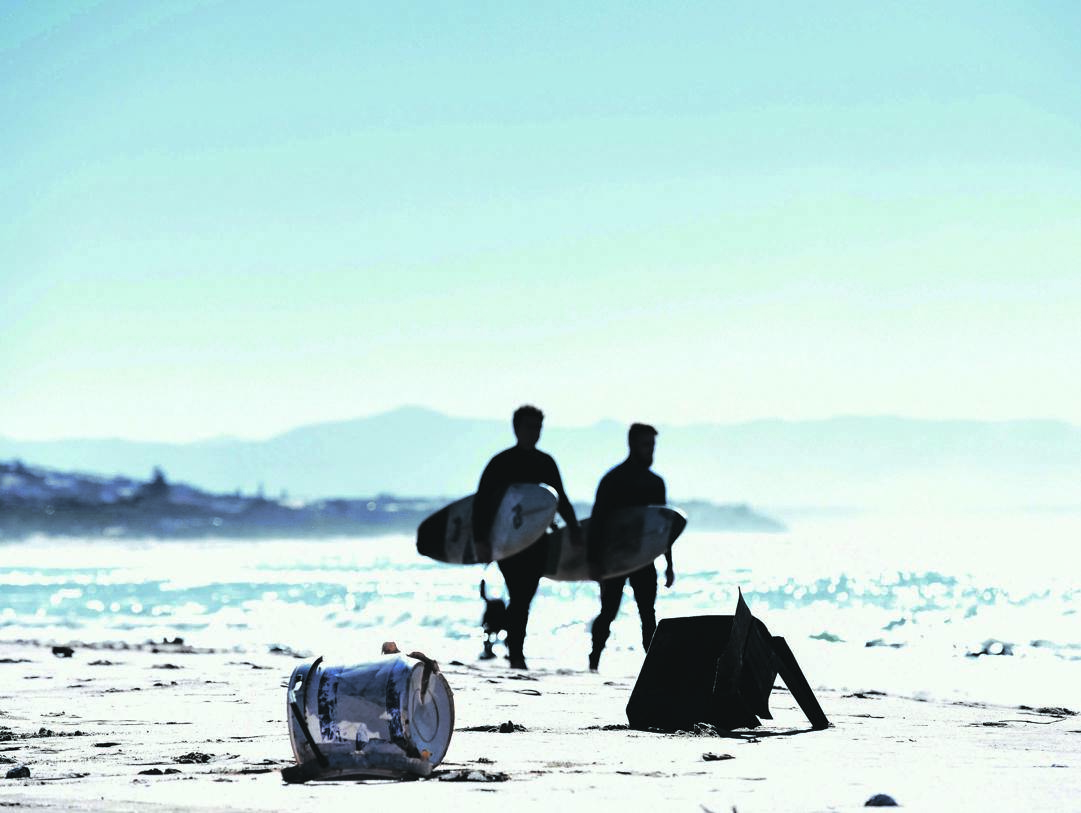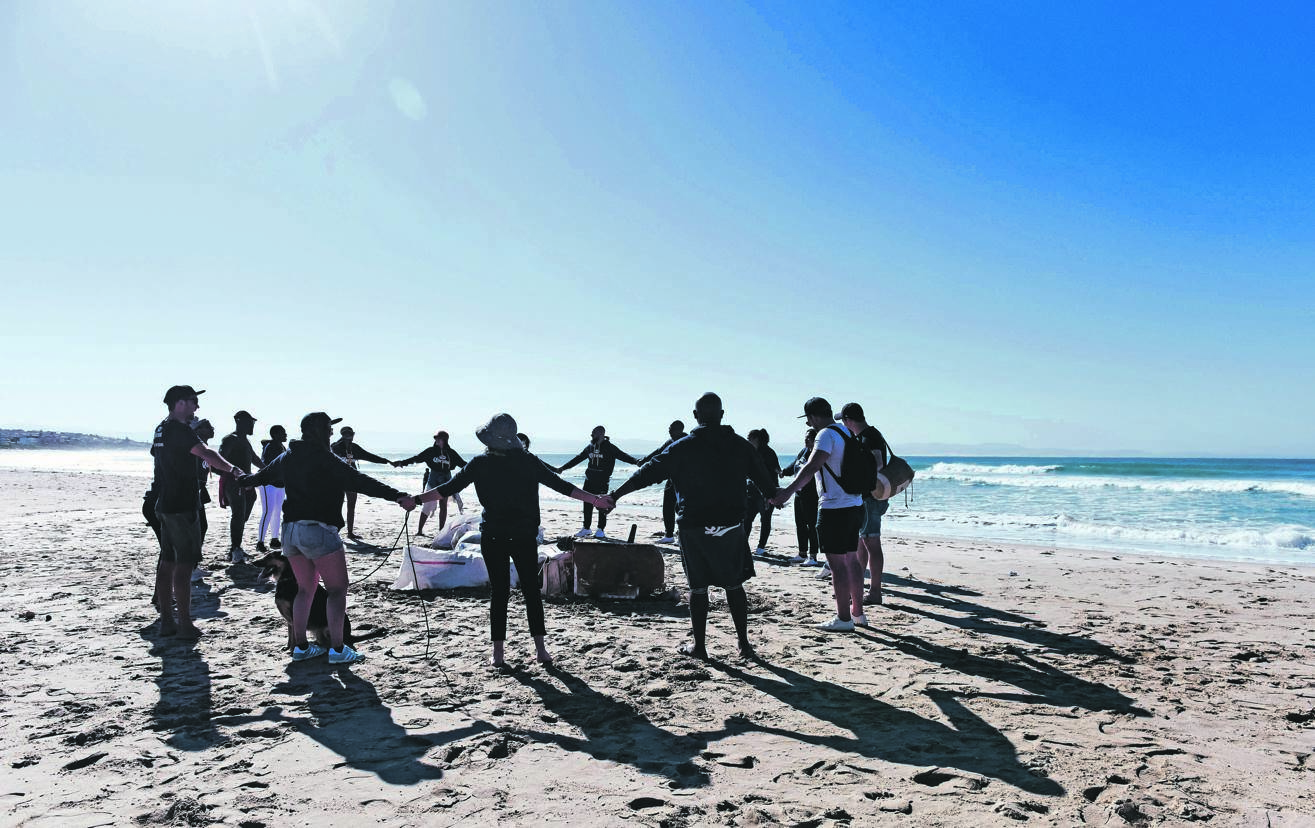
Two waste recyclers and a professional surfer star in a film about pollution of the sea, writes Poloko Tau.
A broken plastic chair and a bucket lie on the sandy beach, spoiling a scenic backdrop of the ocean and surfers walking by in Jeffreys Bay, Eastern Cape.
You cannot miss a purple condom close by on the white sand.
Among the plastic rubbish that has been dumped into the ocean through a nearby stormwater pipe outlet at Jeffreys Bay are an old television plastic frame and a car front bumper.
If this assortment of objects can be swept by the water to the sea, what about small grocery plastic bags littering Bree Street in Johannesburg?
Where will they end up?
Environmental activists have, for a long time, been trying to raise awareness about how the inland areas are connected intricately to the sea by the river systems which carry tons of rubbish from all over the country to the ocean.
There is, however, a story of three men that illustrates just how the inland areas can do more to save the environment and the sea.
Their lifestyles are worlds apart. In fact, two of them have never been to the other’s side of the world.
The only thing that links their two worlds is something they all do – surfing – albeit in their own distinct ways and settings.
In Joburg, they do it for a living and on the other side one man does it for fun, leisure and competition.
Cape Town-based professional surfer, Frank Solomon, met two Joburg-based “street surfers”, Kwena Mokete and Thabo Mouti.
They took him downtown, showed him how they do it – surfing in the concrete jungle while slithering through the city’s busiest streets in traffic.
These are the men who, to some Joburg motorists, have become a nuisance on the road.
They are now part of the city’s usual buzz – often seen sliding on their flatbed trolleys, loaded with large protuberant trash-filled silage bags, cutting in front of speeding vehicles in their daredevil manoeuvres.
At times, they are just sweating it out as they pull their heavy collection of recyclable materials uphill, occupying part of a lane on the road, much to the annoyance of impatient motorists.
Mokete admits it is not always safe out there, because some motorists “don’t take us as important [and] want to be the only ones driving on the road”.
Solomon could not resist giving street surfing a try when he met up with the pair.
With one foot on the trolley like a skateboarder, he uses the other foot to propel the flatbed trolley forward, creating momentum before resting both feet on it and cruising down the street.
Solomon later attests to the dangers of “surfing” on the road.
“I was nearly hit by a taxi while trying to surf,” he says.
Solomon, an adrenalin junkie and a professional surfer, often daringly confronts powerful waves.
On his WhatsApp profile picture, he’s almost enveloped in a barrel of a high wave. After his close shave with the taxi, he spoke about just how impressed he was with the two street surfers’ skills.
After visiting Mokete and Mouti at their homes in an informal settlement and learning about the types of plastic they collect and how they sort them out for selling, he invited them to his home town, Cape Town.
They can be seen gingerly taking steps towards the sea and their jaws drop in awe of their first encounter with the ocean.
“This is amazing…” Mokete says with excitement.
After showing off his surfing skills to the two men who are whistling and cheering him on, Solomon invites them to give it a try.
Clad in wetsuits, the two men get their surfing lessons and have their chances to wipe out (get to an end of a ride) and fall off their surfboards after a brief ride.
This is where the two worlds meet. All this is captured in a short film produced by the production house EyeForce who cast big-wave surfer, Solomon, and the two trash collectors.
Titled Street Surfers, the film was sponsored by Mexican beer brand, Corona, and it hopes to change people’s mind-sets around maritime pollution.
Corona SA marketing manager, Sifiso Pule, says they are using the film to raise anti-maritime pollution awareness, starting with surfers.
The film is being regularly shown at the surfing championship event in Jeffreys Bay.
For many surfing enthusiasts, by the time they left Jeffreys Bay at the end of the Corona Open J-Bay World Championship tour which ended on Monday, they learnt how a fraction of people in Joburg collect recyclable waste such as plastic for a living and how this links in with their recreational playground – the sea.
The film is also aimed at educating those living in inland areas that they are connected to the sea by river systems which take their dumped plastic and wash it to the ocean.
In the sea, it does not only pollute the sea but also kills birds, fish, whales and dolphins, among other creatures that mistake plastic for food.
Unbeknown to them, the two Joburg street surfers have been doing their bit to save the ocean from plastic pollution.
Solomon says through the tons of plastic thrash they collect every day, Mokete and Mouti are saving the ocean.
He adds: “[At least] 80% of the plastic in the ocean comes from the rivers pouring there.
“If you are from Joburg, you may not feel connected to the ocean, but you are through the rivers,” Solomon says.
“These guys collect thousands of tons of plastic every day, saving municipalities about R600 million in refuse collection, and yet they are treated like second-class citizens living in abject poverty. Why can’t their trade be formalised because they are making a life out of it and helping the environment?”
Concerned about the future he adds: “It has been said that in 2050 there will be more plastic in the ocean than fish … then leaving us with a rubbish dump.
As part of the campaign, a number of those attending the surfing event in Jefferys Bay went on a beach clean-up this week.
The scenic background of surfers walking on the beach in search of a high tide was spoilt by an old plastic chair and bucket washed on to the beach.
A car bumper was among the plastic trash dumped on the beach through a huge stormwater outlet pipe, and a bright purple condom was hard to miss.
After the rubbish was removed, Solomon wondered: “How much more plastic makes its way into the sea and ends up in wrong places like in whales’ stomachs?
“It is up to us to take a stand and reduce our use of single-use plastic. Think about it – if 10 million people drank coffee from a takeaway cup with a plastic lid every day, how much plastic will end up in the sea against if we used our own cups or containers when we bought coffee?
“Whether you live in a coastal area or inland, we all have equal responsibility to save the marine environment because it might be that small plastic you throw on the ground in Joburg that ends up in the ocean. Why do you do it outside when you’d never throw any trash on the floor in your own kitchen?”
TALK TO US
How should ordinary South Africans and government respond to the plastic crisis we face? Do you think we face an environmental disaster? Should the use of plastic come at a heavy price?
SMS us on 35697 using the keyword PLASTIC and tell us what you think. Include your name and province. By participating, you agree to receive occasional marketing material.
| |||||||||||||
| |||||||||||||




 Publications
Publications
 Partners
Partners










